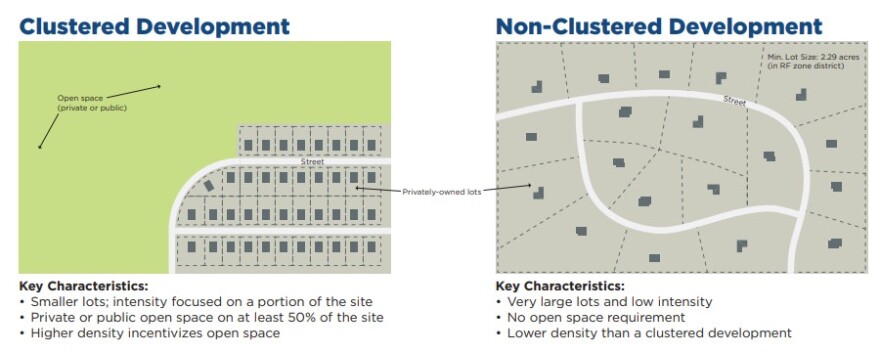Fort Collins city staff are expected to present their zoning recommendations for the former Hughes Stadium site at a public hearing Thursday evening.
It’s the latest step in redeveloping the 165-acre swath of land nestled just east of Horsetooth Reservoir. It’s also the final meeting before the city council makes a decision on the site’s rezoning later this fall.
Ahead of tonight’s meeting, here’s a recap what we do — and don’t — know about the project so far.
How did we get here?
In February, Colorado State University selected homebuilder Lennar Colorado, LLC as the site’s developer. The purchase and sale agreement was valued at $10 million.
Lennar’s proposal included plans to build between 600 and 700 homes.
Here’s a mockup:

As with any new project, Lennar entered into Fort Collins’ development review process, which includes public meetings, design reviews and zoning changes.
Then, in July, the city council took an unusual step. It voted to initiate rezoning on the former Hughes site itself. That action separated the job from the developer, who usually recommends a zoning decision to council.
So, what is the city recommending?
City planners say the land should be divided into two different zoning classifications, including Residential Foothills (RF) in the west portion of the site, and Low Density Mixed Use Neighborhood (LMN) in the east.
Land zoned as “RF” requires large lots (2.29 acres) if homes aren’t “clustered” in a specific section of the property.

Land zoned as “LMN” allows for a variety of housing and commercial developments including child care, convenience stores, or clinics.
Cameron Gloss, the city’s planning manager, said the combination is meant to strike a balance between the community’s environmental concerns and the need for new housing.
“In our professional judgement that was the most appropriate combination,” he said.

What do residents have to say?
Residents have submitted hundreds of public comments about the project online and through several in-person forums.
Some of those comments focus on concerns about the environmental impacts of building 600 to 700 new homes on the site.
Mary Grant moved to a nearby neighborhood three years ago. After hearing about Lennar’s proposal, she joined a citizen’s group called Planning Actions To Transform Hughes Sustainably (PATHS).
“The vast majority of people in our group understand something needs to be done with that property to make it work for the community, for CSU and for the city,” Grant said. “We want it done sustainably.”
Grant’s group has collected thousands of signatures online ahead of the rezoning process. She said their hope is that it inspires more creative thinking about the site’s future.
“It’s the gateway to Horsetooth Reservoir,” she said. “Why couldn’t they put some amenities there for the people who frequent the reservoir could use? Why don’t they do something philanthropic?”
Other residents, like Rex Miller, who owns land just north of the former Hughes site, are more skeptical of the development review process. Miller said he sees it as benefitting CSU and the developer, instead of prioritizing the community.
“It’s just to placate the concerns of the public and totally ignore them,” Miller said. “They’re not being open and transparent. It’s not a level playing field and it’s disgusting.”
What does the developer have to say?
The developer, Lennar, did not return a request for comment on the city’s rezoning process.
In past public presentations, representatives from the company said they’re taking into consideration the community’s concern over environmental impacts.
What does CSU have to say?
Colorado State University spokesman Mike Hooker says the university has been working closely with the city and incorporating public comments to “inform the direction of the project from the very beginning.”
“Although the university, as a state governmental entity, is not subject to city oversight, the university – with the full support of the city – sought to include the future development of the Hughes property for private housing within the city’s development process,” Hooker said. “We understand the city has a responsibility to consider many factors in making zoning decisions and that it will govern itself as it sees fit.”

Is there a chance the property won’t be developed at all?
At this point, probably not.
Fort Collins’ Natural Areas Department can only buy land from a willing seller. CSU has already announced it intends to sell to a developer.
In a statement, the department’s director John Stokes said, “there would be significant opportunity costs associated with a purchase. For example, funds directed to the Hughes site would not be available for conservation in northeast Fort Collins which has no natural area sites. The Hughes site, on the other hand, has nearby natural areas of over 1,000 acres with nearly 10 miles of trail as well as a large community park.”
What do we know about environmental impacts (traffic, habitat loss, etc.)?
A traffic study has not been completed yet.
According to Fort Collins staff, once both the zoning and development plan have been finalized, they will conduct a traffic study.
“All (development) scenarios will require some level of transportation improvements,” the city said in a statement. “The lower density scenarios will generate fewer trips and may require fewer improvements.”
Natural Areas staff are also considering upgrading trails at the nearby Maxwell Natural Area, including a new trail that separates hikers and horseback riders from mountain bikers.
Other environmental impact studies will come after rezoning.

What are the next steps?
After the Planning and Zoning Board meeting Thursday night, city council will weigh a final decision on rezoning later this fall.
It’s unclear how the city’s zoning recommendation will impact the original proposal of 600 to 700 homes on the site.
Then, the city will conduct a final development review before any work begins on the actual site.
Information about tonight’s meeting:
The Planning and Zoning Board will conduct a public hearing at 6:00 p.m. at City Hall, 300 LaPorte Ave, Council Chambers.






